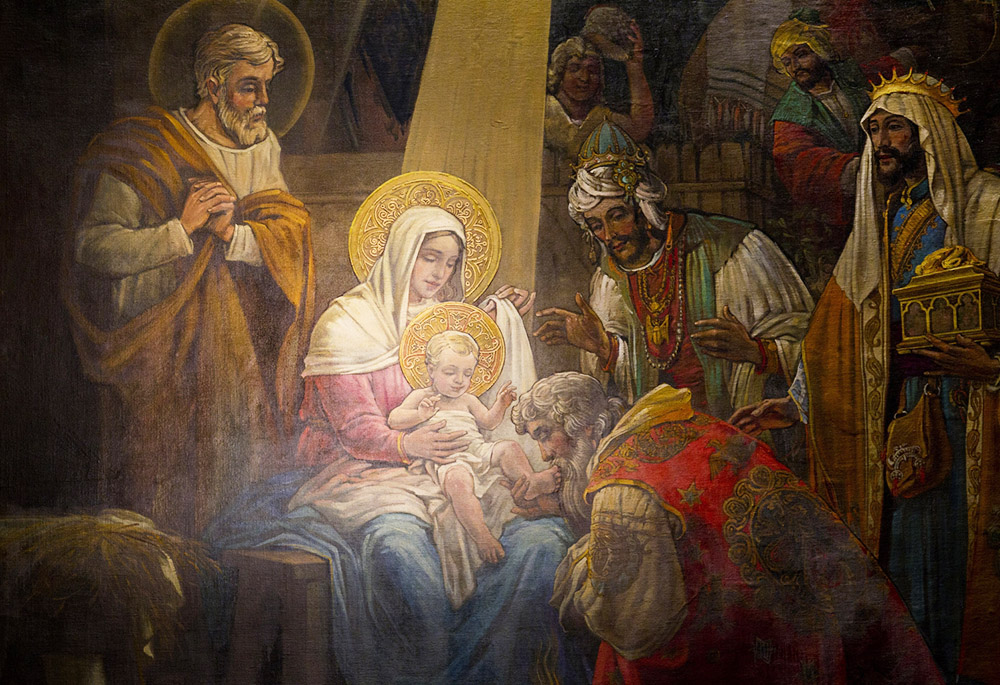
The adoration of the Magi is depicted in a painting in the Cathedral Basilica of Sts. Peter and Paul in Philadelphia. (CNS/Nancy Phelan Wiechec)
Our Nativity scenes seem incomplete until the 12th day of Christmas when the Magi finally arrive at Jesus' crib for the first celebration of the Epiphany. Although Matthew is the only evangelist to mention the Magi, they've become essential to our Christmas scenes. What do they tell us about the Gospel?
Matthew wrote his Gospel for a Jewish-Christian audience, followers of Jesus who understood themselves as God's chosen people. Their first make-it-or-break-it challenge came when "pagans" (Gentiles) were being baptized without also becoming Jews (Acts 15:1-30). Matthew's story of the Magi challenged the orthodox party that tried to close ranks and keep the community "pure."
Matthew gives minimal attention to Jesus' birth: it is mentioned only in the opening line of today's Gospel. Matthew's key Nativity characters are Joseph, the angel and the Magi. Mary is a supporting character; she gives birth and is at home when the Magi arrive. We think of the Magi as three, based only on the gifts they bore. In reality, they probably traveled as a caravan — they needed a sizable group to protect their valuable cargo.
Let's assume that the Magi were a caravan of seekers. Religious pilgrims in every sense of the term, they sought a deeper understanding of the mysteries of life. Specialists in reading the heavens, they scrutinized the skies and set out as pilgrims when a portentous sign appeared outside of their homeland.
Like anyone awestruck at the proliferation of stars, the seemingly endless ocean or the grandeur of mountains, they had discovered an exceptional star and knew it heralded something spectacular. Some combination of curiosity, yearning of heart and a conviction that there was more to life than they already knew impelled them to pack their most valuable gifts and venture into the unknown, ready to welcome whatever they might find.
Their journey led them to one of the world's greatest despots, and to priests and scribes who couldn't fathom their curiosity and desire. For different reasons, both Herod and the religious leaders found the Magi's quest threatening. When the humble Magi asked for expert help, they heard from scholars who studied the Scriptures but failed to internalize their message. With no perception of the irony of pointing Gentiles toward their Messiah, they informed the Magi that the prophecies all pointed toward Bethlehem. So, the pilgrims journeyed to Bethlehem where they discovered the child and his mother. There they did what they had set out to do: They gave homage to someone about whom they knew nothing except that his star enticed them.
Matthew uses the word "homage" three times in this short story. What is homage? The Greek word Matthew used has a variety of meanings including to bow down, to prostrate oneself, to kneel before another and even to kiss. We easily picture them bowing or kneeling, but did you ever imagine the Magi kissing the baby? After all, it's a normal response to seeing a little child and a gentle, loving sign of acceptance and willingness to protect. Finally, to concretize their homage, the Magi presented their gifts and returned home "another way," changed people who had recognized what others refused to see.
Advertisement
As the liturgical season of Christmas draws to a close, the story of the Magi doesn't complete the season as much as it invites us to look again. These seekers invite us to scrutinize the signs around us and to once again contemplate the mystery of God's love and humanity's responses of desire, faith, fear and rejection. Rereading the infancy narratives in Luke and Matthew puts us in contact with the grace known by Mary of the Annunciation, Joseph of dreams and the Magi who followed their hearts' desire for greater faith. Herod and the culpably incurious religious leaders remind us of how easily we human beings can be threatened by new revelations, especially when they might upset the status quo or come from "foreigners."
As the liturgical season of Christmas draws to a close, the story of the Magi doesn't complete the season as much as it invites us to look again.
Matthew presents the Magi as models of discipleship. First, and most disturbing to Matthew's community, the Gentile Magi were global disciples; people who, like Paul, were more open to mystery than were the leaders of the chosen people. Secondly, they were so perceptive that they could do homage in the mindboggling simplicity of Jesus' vulnerable humanity.
The pilgrim Magi remind us that we too are invited to be humble enough to see something new. They help us realize that there is always more to discover in God's mysteries. They suggest that the willingness to venture into the unknown might even lead to the opportunity to kiss the face of God.
